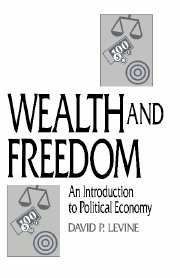4 - The self-regulating market
Published online by Cambridge University Press: 20 March 2010
Summary
Markets
The solution to the problem of how to create a wealthy society suggested in Chapter 3 is an institutional solution. That is, it proposes a way of organizing economic activity that will, more or less automatically, increase society's wealth. This organization makes the use of society's productive capacities (especially its capital stock and its labor) depend on private transactions (exchanges) between their owners.
Market refers to a set of exchange transactions by which money and goods change hands. This may be a subset of the exchanges entered into during a given period of time – for example, the labor market, the market for cars, the stock market. Or it may include all transactions undertaken during that period, in which case we refer simply to the market. A capitalist economy is a market economy par excellence. It organizes the bulk of economic activities through markets.
An important question to pose when we consider organizing our economic affairs through markets is whether doing so will work. That is, will private contracts undertaken to advance private interests assure that wants are satisfied? To satisfy wants, a complex set of goods must be produced and find their way from their producers to those who need them. Producers must be able to acquire needed inputs from those who own them. These inputs must be produced in quantities appropriate to assure adequate supply, and they must be available at prices that enable those needing the inputs to buy them given their incomes or revenues.
- Type
- Chapter
- Information
- Wealth and FreedomAn Introduction to Political Economy, pp. 48 - 57Publisher: Cambridge University PressPrint publication year: 1995



